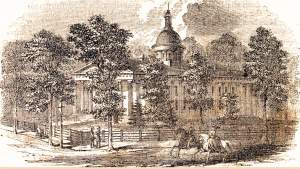Record Data
"Colored Convention," Evansville (IN) Daily Journal, November 16, 1866, p. 2.
"Indiana," The American Cyclopedia and Register of Important Events of the Year 1866 (New York: D. Appleton and Company, 1873), 405.
Transcription
The following text is presented here in complete form, as it originally appeared in print. Spelling and typographical errors have been preserved as in the original.
To the Loyal Voters of Indiana:
FELLOW CITIZENS: The time has come in the history of our State, when all of its citizens, irrespective of race or color, should be permitted to exercise equal rights. There are twenty thousand colored men in the State. We have always been loyal to the Government. We furnished our full quota as soldiers for the suppression of the recent rebellion; how heroically and faithfully those soldiers fought, let the record of the 28th regiment U. S. C. Infantry tell. We pay taxes to the amount of $--- yet we are deprived of some of our clearest and most valuable rights. We are denied the elective franchise, and thus deprived of having a voice in the choice of our rulers. To deprive us of this is to disregard the cardinal principles of the Declaration of Independence; that immortal instrument declares that all governments derive their just powers from the consent of the governed. In the language of President Lincoln, we hold that every man should have the right to be the equal of every other man, if he can; this we cannot do if color is made the criterion by which we regulate the rights of man.
We are aware that it is objected that we are too illiterate and ignorant to have a voice in deciding the question of State and National interest. But while we claim that we are equally as intelligent as thousands of other citizens of the State who do vote, we hold that virtue and patriotism are more essential qualifications in the voter than intelligence. If we have had virtue and intelligence enough to fight on the right side, certainly we will not vote on the wrong side.
VVe are not asking for at social equality. Social equality does not exist in any country or community. The members of your Legislature do not regard one-half of their constituents their equal socially. Such equality cannot be brought about by legislation, but depends upon culture, and is a matter of taste. Because men go to the polls and vote on equal terms, is no reason that they should associate together, unless they choose to do so.

